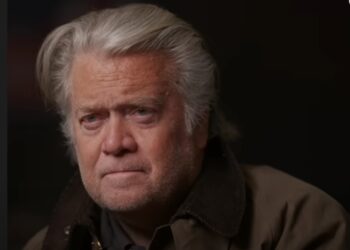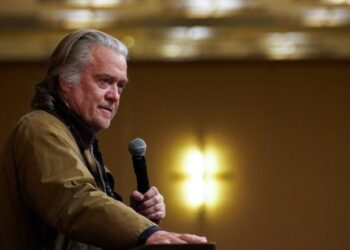Tom Fitton On Evidence Showing Nancy Pelosi And Fani Willis Colluded Against President Trump And J6ers
Steve Bannon and Judicial Watch President Tom Fitton discussed alleged collusion between Fulton County DA Fani Willis and Nancy Pelosi’s January 6th Committee. Fitton revealed that Judicial Watch obtained evidence of communication records linking these parties, which they had initially denied existed. After suing for transparency, a court ordered Willis to release the documents and pay attorney fees, reinforcing concerns about systemic efforts to target former President Trump and his supporters.
Fitton argued for the appointment of an independent special prosecutor to investigate these actions, emphasizing the need for separation from the Department of Justice due to its alleged compromise by entrenched partisans. He highlighted the challenge of addressing widespread corruption and resource allocation, underscoring the magnitude of necessary investigations.
Bannon and Fitton also touched on broader issues, including alleged Biden administration corruption, election integrity, and the lack of accountability for events like the January 6th Capitol breach and Ashley Babbitt’s death. They advocated for transparency and justice, stressing the importance of independent investigations free from political influence.
Fitton recommended steps for a potential Trump administration, including establishing a special counsel to conduct criminal investigations and bypassing DOJ interference. Judicial Watch’s ongoing efforts to uncover and expose corruption were praised as critical to ensuring accountability and restoring public trust.
The discussion reinforced their commitment to challenging the establishment and seeking justice for alleged misconduct against Trump and the broader conservative movement.
"We’re Doubling Down”: Matt Boyle Previews The Expansion Of Conservative Media Following Readers Abandonment Of Legacy Fake News
Steve Bannon and Matt Boyle argue that the mainstream media has lost touch with the American public, particularly regarding issues like January 6th and broader political concerns. They highlight the disconnect between the establishment media’s narratives and the priorities of everyday Americans. According to Bannon, platforms like WarRoom and Breitbart have successfully changed the narrative by exposing the truth about January 6th, leaving legacy media in “complete meltdown.” Boyle reinforces this, criticizing the media’s obsession with outdated, elite-driven agendas that fail to resonate with the public.
Both contend that the mainstream media’s decline stems from its alignment with globalist elites and its inability to adapt to the evolving media landscape. Boyle emphasizes that Breitbart and similar outlets have stepped into the void left by traditional media, focusing on issues that matter to ordinary Americans. He also underscores the structural failures of institutions like The Washington Post and The Wall Street Journal, blaming their billionaire owners and entrenched ideologies for their disconnect.
The discussion concludes with a call to action for alternative media to double down on exposing corruption, holding elites accountable, and addressing the public’s real concerns as they prepare for Trump’s potential return to power in 2025.
Jason Trennert: China Joining The WTO Was A Massive Wealth Transfer To The American Middle Class To The Chinese Middle Class
Steve Bannon and Jason Trennert discussed a Financial Times article by Gillian Tett that delves into the economic principles of “MAGA-nomics,” particularly its focus on trade, tariffs, and populist-nationalist economics. Trennert emphasized that China’s entry into the WTO led to a significant wealth transfer from the American middle class to China, benefiting corporations but decimating the U.S. working class. He noted that while this view was once seen as unorthodox, it is now gaining bipartisan recognition as both parties increasingly view China as a key economic rival or enemy.
The article marked a shift for the Financial Times, traditionally a globalist publication aligned with the rules-based international order. Bannon and Trennert were surprised by the even-handed treatment of Trump-era economic policies, acknowledging the political and economic dissatisfaction fueling populist movements globally. Trennert praised the focus on fair and reciprocal trade, arguing that multilateral trade agreements often favor special interests over working-class Americans.
Bannon celebrated the article as a “seminal moment” for the populist-nationalist movement, highlighting Peter Navarro’s contributions and the intellectual foundation of MAGA economics. He encouraged readers to study these ideas, which challenge traditional economic orthodoxy and emphasize sovereignty and fairness in trade.
"The Best Way To Take Down The Mullahs Is Internally”: Erik Prince On The Muslim Brotherhood’s Influence In Washington
Steve Bannon and Erik Prince discussed several pressing global and national issues, starting with the situation in the Red Sea, where U.S. Navy forces are engaged in direct confrontations with Houthi rebels. Bannon criticized the Biden administration for releasing Yemeni detainees from Guantanamo Bay, potentially enabling hostile actions against American forces. Prince highlighted the irrationality of this decision, citing the precarious situation of U.S. sailors defending critical trade routes and enduring costly missile defense operations.
They delved into a recent incident where a U.S. Navy ship allegedly shot down its own F-18 fighter jet, which Prince attributed to operational failures or possible Houthi interference. This highlighted concerns about U.S. military readiness and the administration’s priorities in managing such conflicts.
The conversation shifted to Ukraine, where Prince criticized Ukrainian President Zelensky for canceling elections and prolonging the conflict with Russia. He argued that the U.S. should focus on securing its own borders rather than providing limitless support to Ukraine. Both emphasized the need for a pragmatic approach to U.S.-Russia relations, advocating for policies to separate Russia from its growing alliance with China, which they viewed as a significant strategic threat.
Prince recommended that Trump prioritize American security and economic interests, suggesting that U.S. foreign policy should focus on preventing alliances detrimental to American dominance. The discussion reflected their shared critique of the Biden administration’s foreign policy and their alignment with an America First agenda.





